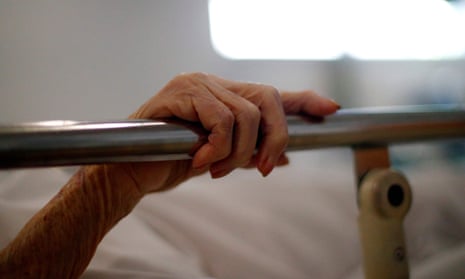Regarding your article on patients stuck in hospital, I was cured in three weeks, but not discharged for 16 (Up to one in three English hospital beds occupied by patients fit for discharge, 13 November). After three weeks, the nurses who had cared for me when I needed to be cared for had to spend 10 minutes every day chatting and checking up on me to make sure that I wasn’t becoming depressed. Add on other patients in the same position and this takes up a significant part of the exhausting 12-hour shifts that most of these overworked, underpaid and dedicated people have to work.
Feeding me and changing my bedding when I could have done that at home was another unnecessary cost to the NHS. I couldn’t be discharged because there were no carers available for weeks to check that I was coping independently. I was. Also, the carers were so badly paid that most of those I saw had to take other jobs to make ends meet. I wonder how many members of this Tory cabinet (if any) rely solely on the NHS for their medical care.
John Griffiths
Monmouth
Our family has benefited from the services of carers for our adult son who has a disability and is in a wheelchair. They help us to get him up every morning and get ready for bed each evening. We see their work at close hand and regard them as very hard-working, professional and unfailingly cheerful. They have also become members of our family and good friends to our son. They deserve better rewards.
The agencies that employ them will only secure contracts by keeping costs to a minimum, a big part of which are wages. It just seems so obvious that if they were paid more, extra staff could be hired and hospital beds could be freed. I do realise that extra care home places would be required, but what happened to all the local authority homes that disappeared because the “private sector” would provide?
Name and address supplied
It used to be the norm for local community hospitals to provide a “step-down” function for acute hospitals – somewhere that recuperating patients could move to immediately after treatment while preparing for their return to normal life. But the official guidance no longer highlights this as a pathway for discharged patients.
Moreover, in recent years NHS England and its cohorts at local level have been closing beds in community hospitals, despite local resistance in places such as here in the far west of Cornwall; we used to have two community hospitals and have now lost both. Certainly, local social care services are under huge stress. But the real scandal is the lack of joined-up thinking in the NHS.
Dr Peter Levin
West Cornwall HealthWatch
For too long, the fix for social care that has attracted the most attention has been protecting older people’s assets – principally the value of a home they will no longer be living in, so that inheritances can continue to grow in line with the distorted housing market. Meanwhile, the social care sector is on its knees, with local authorities unable to pay fees, care providers unable to recruit and retain sufficient staff, and hospitals providing bed and board rather than medical care.
The case for creating a national care service has never been stronger, and if there isn’t a clear commitment to address this as a top priority, the impact on health services will be even more far-reaching.
Les Bright
Exeter, Devon
